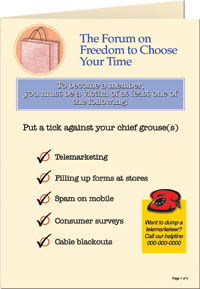 |
Sorry! Did I wake you?
Banks, cellphone companies and others drove consumers crazy throughout 2004 with their aggressive push-sales strategy, sophisticatedly christened ?telemarketing?. Trying to outdo their competitors, they first fattened their databases, then dug into them and dialled numbers left, right and centre. The phone rang incessantly and at odd hours of the day (just when you had planned a lie-in, for instance). While consumers found themselves answering groggily at those unearthly hours, or angrily during busy office time, on the other end, chirpy voices with put-on accents tried to sell the earth and everything else under the sun. Alas, the only thing not on offer was that expensive commodity: silence. One journalist complained that a persistent salesgirl besieged her on her office landline seeking her views on subjects such as credit cards and home loans, even opportuning her for the names of colleagues, so she could pester them as well. Not that we don?t acknowledge the telemarketeers? point of view. As Muhamed Muneer, CEO of Innovative Media, has been quoted saying, ?Enlightened marketeers know that databases are dynamic tools. How can you expect to know about customer needs if you are not asking the right questions? Or the right people?? As a person who has worked with brands as high-profile as Ford, GM and Unilever, Muneer knows what he?s talking about. But is the whole world composed of the ?right? people?
Heard this one?
One of the things we would like to see go in 2005 is the onslaught of unwelcome, uninvited short text messages on our mobile phones. Ranging from cricket updates to breaking news about sales at shopping malls, not to mention that bane of the computer age ? obscene jokes from total strangers ? this mobile phone spam not only clutters up our inboxes, but wastes our time, if only in deleting them.
Mobile phone companies can surely grant us the freedom to choose whether or not we?d like to be bombarded with junk mail. And to those who invade our privacy with bad jokes, all we can say is, ?Get a life!?
How old are you?
As if your life as an average urban-dweller was not already filled with all sorts of complications, throughout 2004, you found yourself at the receiving end of strange requests from complete strangers. They accosted you at street corners and shopping malls, asking you to fill up all sorts of strange and complicated forms. One consumer, a social worker, complained that while she was standing in queue outside her ATM counter, she was asked to fill out a form that would reveal, among other things, her address, phone number, e-mail identity, age and marital status. ?It was a survey for a tobacco company,? she said, ?and I refused to stand there giving out all this personal information. But the represen- tative from the research company was persistent and very pushy?. If you say you?d like to see an end to such invasion of space and privacy in the coming year, we don?t blame you.
Gotta minute?
They arrive at our doorstep with a little help from our friendly neighbourhood market research representative, who wants to know such personal things as what brand of toothpaste we use. They pop up at us at unsuspecting moments when we?re checking our e-mail and request us to ?please? spare a few moments of our valuable time to answer inanities to do with how much electricity we thought a couple who liked to keep the lights on expended on sex. These are the surveys ad nauseam! Research agencies swear by their importance. The website of one of India?s biggest market research agencies, for instance, claims that its mission ?is to help its clients take decisions on the basis of the best possible information?. It adds, ?In the enormously complex Indian market that has confounded so many marketeers, particularly multinationals, the value of better information needs hardly to be emphasised?. Sure. We don?t deny the uses of such information as what impact HIV/STI prevention programmes had in five states of India in 2004. But do we really want to know what per cent of Indian males like to use mint toothpaste or that fewer than one in 10 teenagers believes that music piracy is morally wrong?
Which channel did you say?
A major irritant for television consumers throughout 2004 has been the out-of-the-blue cable blackouts. Suddenly you found that you couldn?t watch your favourite sit-com, Friends, because you didn?t get Zee English anymore. Football-lovers in parts of the city complained that they were deprived of such programmes as the UEFA Champions League because ESPN and Star Sports channels were taken off the air without so much as an explanation. In 2005 we?d like to see an improvement. We?d like to request all four MSOs (multi-system operators) in the city to settle your monetary squabbles with the broadcasters and give us back our choices and our channels.











